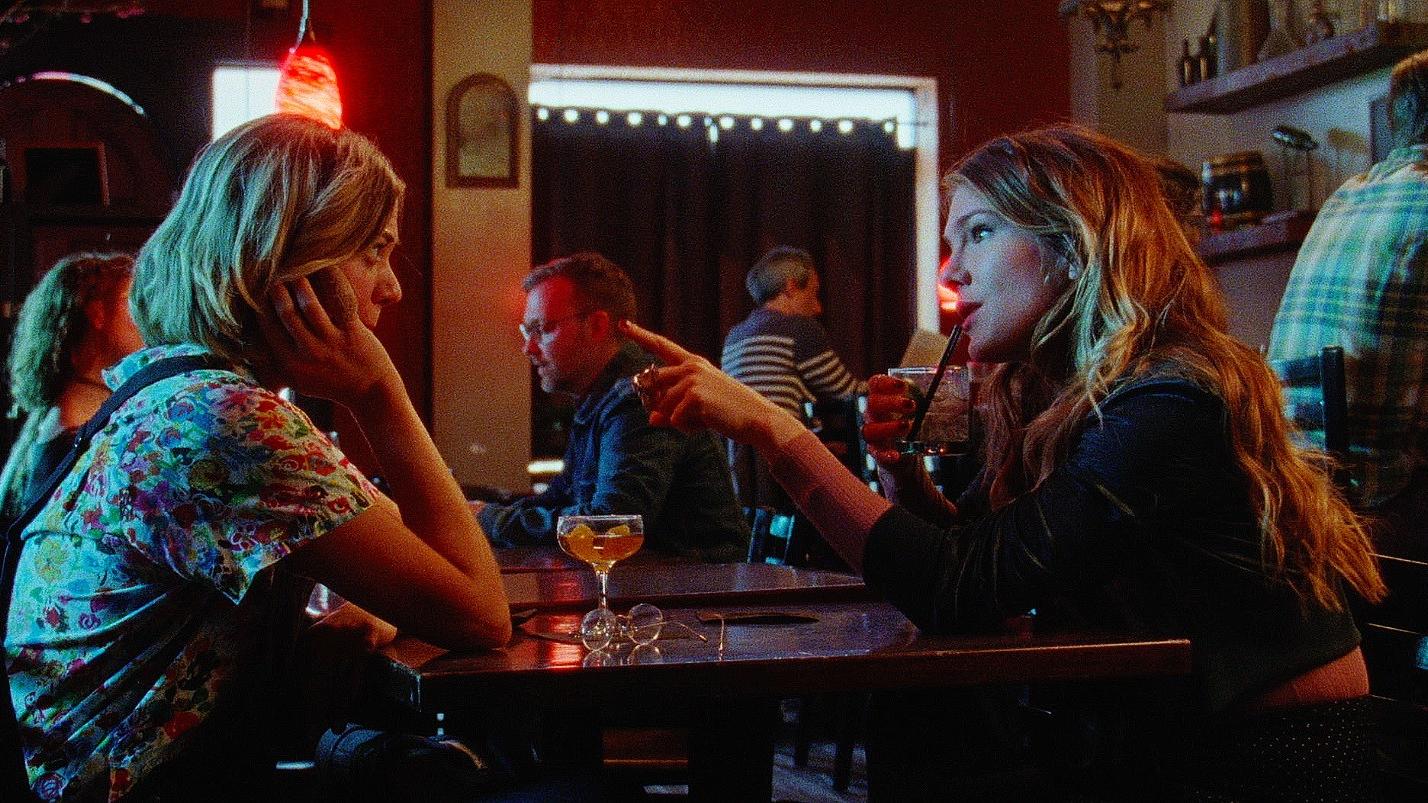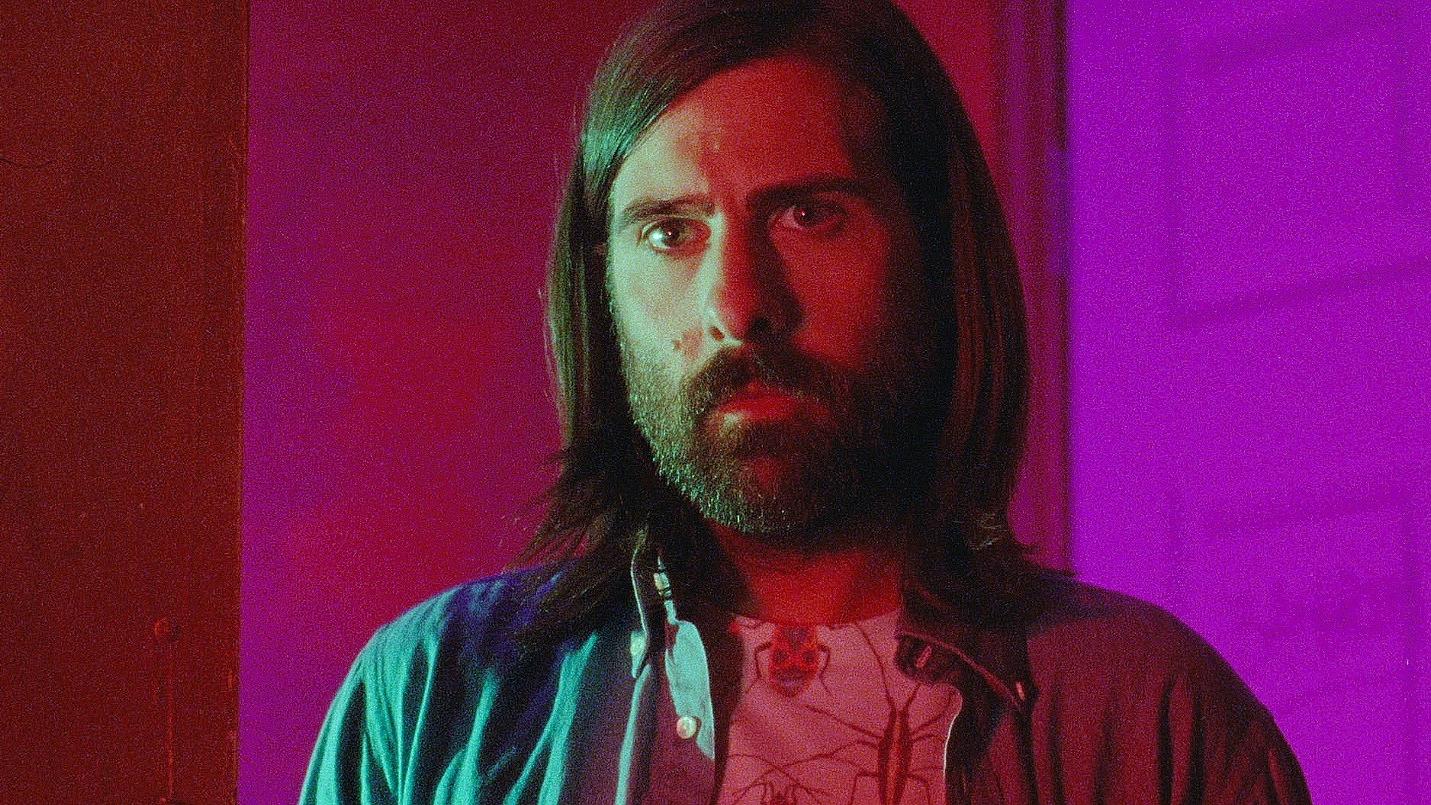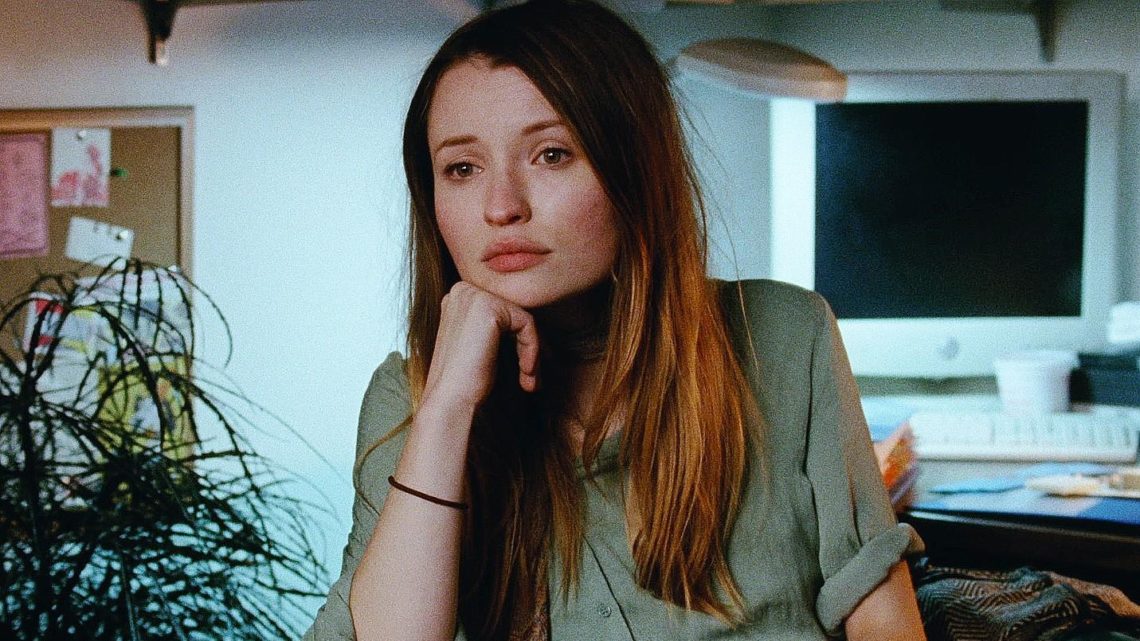As I turned off my audio recorder, director Alex Ross Perry apologized for wasting my time on tangents and digressions. I told him no worry – these kinds of interviews are the more interesting and revealing kind anyways. He gathered with a selection of cast members – Emily Browning, Adam Horovitz, and Analeigh Tipton – on a couch to discuss his fifth and latest film, Golden Exits, the day after it premiered at the Sundance Film Festival. Questions about technique quickly gave way to unconventional anecdotes, hilarious comparisons, and an argument over why Perry has no interest in seeing the latest Vin Diesel movie.

Movie Mezzanine: Alex, it strikes me as odd to see a movie about people confronting disappointment from a director like you, who’s among the most prolific and praised of your cohort. What drew you to tell this story?
Alex Ross Perry: It seems weird to see a movie about people dealing with disappointment from me? I made five movies in a row about disappointment.
Emily Browning: If you know him, it doesn’t [seem weird].
ARP: I don’t think I’ve made a movie that’s not entirely about people confronting some kind of disappointment in events in their lives that makes them incredibly confused.
Fair enough!
ARP: This one just does it without any direct confrontation.
Maybe a little less comedy.
ARP: Yeah, almost none, hopefully – although evidently not.
You use a fair amount of close-ups – where did that fascination begin?
ARP: I don’t remember – I’m sure it just began with cinema and not understanding the impact of seeing close-ups. I can’t point to a movie that I watched, like the first time I saw Dreyer’s [The Passion of] Joan of Arc, I don’t have that.
The close-up is the only, I believe, exclusive device of movies. There’s no other way to see a moving face that close, that large. You’ll never see it on a television, a billboard, a huge photo if it’s not moving. To see a face up that close, to see its tiny little emotive ticks, you can only do that with a movie, in a movie theater, shot properly in close-up. Because of that exclusivity to the way films are made, it’s something I tend to really favor.
Analeigh Tipton: There’s a trend, I’ve found, with films lately not doing close-ups. In a lot of the meetings I take, they want to shoot them all wide. I feel like every time the outcome of that, it lacks so much. And they’re trying to fill in because the audience misses so many nuanced messages. I’m sure there are directors who can do that fantastically –
EB: It’s like a different style of film. If it’s done well, it’s almost like a play that’s being documented. But it’s often not done well.
AT: There are certain times and scenes to do that [wide shots] if you want that kind of distance. But if you want an entire thing like that … I’ve found that there’s a bit of a trend to do that. If there were not access to such a personal space, the audience would realize they were just an audience instead of observing this person.
ARP: The whole idea for this movie was to shoot a lot of it in two-shot. I’ve never done two-shots before, which I know because every time I have to make a still to promote a movie for a festival program, I never have stills of two actors. In my other movies, it’s always close-up. So this, I wanted to do a lot of two-shots and make the close-ups something instead of doing an entire movie of them. If you see a three-minute scene of Adam and Emily talking, and then it cuts to a close-up of him, you have to say, “That must be for a reason.” And it’s not to get out of the scene. It’s because you want to see something different that you don’t see in the wide shot.

I’ve read things about how the close-up is a shot that registers really well on phones and computers.
ARP: [deadpan] That’s definitely what we were thinking.
EB: Do people actually watch proper movies on a phone? I can understand if you’re on an airplane and you’re watching a half-hour comedy. But would you watch a film on your phone?! Come on.
ARP: I see people do it all the time on the subway. We did the sound mix for iPod headphones and the color correct on an iPhone.
EB: A little fact about me – I was about to say “interesting,” but it’s not interesting at all – I cannot use iPhone headphones because my earholes are too big.
Adam Horovitz: Yeah, me too.
EB: Really?
AH: Yeah, I have the headphones with the hook.
EB: Me too! The big ones.
ARP: Phil Spector used to take a finished song out to the car and listen to it to make sure it sounded good blasting out of an ordinary consumer radio, so we maybe should mix these and color correct them for phones. Just so the worst it looks, it’s still OK.
It’s just so depressing to me, coming to a place like Sundance and seeing some of these movies and knowing that I’m going to be one of, like, three audiences to see them with people.
ARP: Well, that’s pretty pessimistic.
I hope that’s not the case for you!
AH: Three people?
ARP: No, three more public screenings. Three more times people will congregate to watch this movie … according to Movie Mezzanine.
EB: Even when movies are in a movie theater, so many people don’t watch them that way. I don’t go to the movies as much as I should, but when you go it feels so special and nice. But also when you have everything on your Apple TV…
ARP: As long as you’re watching something.
AT: I mean, you go to the movies like 20 times a week, right?
ARP: Yeah, I go to the movies almost every day. But it always feels special. Always the best part of my day.
AH: So you’re not going to see xXx?
ARP: I’m going to skip that one.
EB: But you have high-low tastes, right? You usually see all the movies.
ARP: I see a lot of movies. I love blockbuster, Hollywood cinema, but that one’s not for me.
EB: What is that? xXx?
ARP: It’s the Vin Diesel sequel to the extreme secret agent movie he made 20 years ago.
EB: Vin Diesel’s not for you? What the fuck is wrong with you?
So when you’re working with a director like Alex and know you’re going to be shot a lot in close-up, does that change the way you perform?
EB: For me personally, it can’t. I had to teach myself to – it’s weird, because you have to [be] completely unaware of the camera whilst also knowing where you are in the frame, knowing where you can go and can’t go. It’s just a learned thing. I’ve been making movies for almost 21 years, so now the camera doesn’t bother me as long as there’s a character to play. As soon as there’s a camera in front of me for an interview and I have to be myself, I’m terrified. When I’m on set, you have a vague idea of what’s going on in the shot, where you have to be, what you have to do, and then you just have to figure it out.
AT: I think for me, it depends on the director, and the character, and on the scene.
EB: If you don’t trust the director, that’s a different story.
AT: But really intimate scenes or crying scenes, I just shut down. It helps me to know when and where to give different variations that match each line – it’s almost a continuity thing.
EB: Continuity, on this film? Did you have a continuity person?
ARP: No, Adam was very outspoken about the lack of script supervision on this movie.
EB: Oh, see that’s my favorite, favorite one. I pretty much get along with everyone on every job I do, but if I ever butt heads with anyone, it’s the script supervisor.
ARP: That’s why we don’t have them around. But you [to Adam] really wanted one. You really wanted one.
AH: I was just concerned for you, and for all of us.
EB: But if someone is noticing the fact that my hair is in front of my face, and then it’s behind my ear, we’re not doing our job. If someone notices a detail like that, then the movie sucks.
ARP: Except when I noticed that, you argued with me about whether I was right or not.
EB: Did we do that?
ARP: About down or up in something.
EB: That’s different, but that was also me doing my own continuity because it’s easy. I knew my hair was over.
AT: It does make perfect sense because I have watched myself in scenes, and I think it will be a good scene, but god DAMN it, my bangs were over here in one shot. And what happens is that it takes the audience out for a second.
EB: But I wonder if it takes the audience out, or if it takes us out.
AT: I think there have been a few instances where just for a second – and it doesn’t change anything, but we’d just like to avoid that if possible.
ARP: If possible. I wouldn’t like to avoid it enough to have another mouth to feed in order to avoid it. Between me and the actors, I think we’ve got it.
EB: The thing that bugs me is when you can hear when a line has been ADR-ed between two lines that haven’t.
ARP: Did you catch the one ADR line in this movie?
EB: Is it Analeigh’s?
ARP: Nope.
EB: Really?
AH: It sounded like it happened a few times.
ARP: One.
EB: Maybe it was a wild line then because when you were facing the cabinet, and then you turned around, that line at the cabinet sounded really changed.
ARP: I’ll reveal it when the microphone’s not recording. Obviously, it has nothing to do with any of you, or you’d remember doing it. So that limits it to four other people.

You mentioned in the Q&A that your editor Robert Greene whittled this down from 120 minutes to about 90. All your films, with the exception of Listen Up Philip, have been about this length. Do you self-impose a 90-ish minute boundary on yourself?
ARP: No, I didn’t care how long this movie would be. But the assembly that just was the script wasn’t perfect. It didn’t need to be that.
Listen Up Philip is 108 minutes, and when I was here with it, it was the third longest American film at the festival. They just don’t let movies be longer than that anymore, audiences reject them. What limited opportunities there are for movies to screen, movies that are over 100 minutes, is just not popular. I would love to make movies that are like 140 minutes long, but like ten people can do that. This movie feels good as a 90-minute movie. It didn’t feel good as 115-minute movie.
You have a way of using old techniques or formats without being overtly nostalgic, in my opinion – like the film stock or the split diopter shot in the film. How do you keep yourself from indulging too much?
ARP: I don’t think I do, but if you think I do, then that’s great.
I don’t think you do.
ARP: You think I stop myself from indulging too much? I’m saying I don’t stop myself, I indulge mightily.
But I think compared to some people – in the hands of some people, a split diopter shot would be an obvious DePalma reference meant to make people feel good for recognizing it.
EB: Do you [to Alex] remember when you were putting in the split diopter, and I said I thought it was gimmicky and stupid. It actually worked!
ARP: Yeah, it was just one shot. We used a lot of it in Queen [of Earth, his last film] where we’re in much more of De Palma mode. I just like stuff like that, simply put. Everything I ever saw and loved up until five years ago was nothing but these old techniques. So these techniques are just the only things that make sense in my mind. It’s just analog stuff, I don’t know the bells and the tricks. I just like to shoot film, and then you get what you get and don’t change it. You just kind of figure it out on the set. We kind of bonded over analog…
AH: I was just going to say, I really liked the score. Kind of early ‘70s.
ARP: Mellow.
EB: It wasn’t mellow towards the end, like a horror movie.
ARP: No, it gets big. But even like an analog old technique, it’s a bummer that we can’t afford on these smaller movies to record the score with ten musicians. Listen Up Philip’s score was recorded with five musicians, which was really neat.
AT: But what he said was true, it doesn’t come from a place of – it’s not exclusive. A lot of people who do use those techniques come from a distant privilege. If you [Alex] mean that by indulging it, it’s applying it because they love it enough to use it.
ARP: Classically trained French chefs, you’re not going to be like, “Wow, you use a lot of old techniques, what’s the deal with that?” It’s like, “That’s how I do it. That’s how I learned to do it, that’s the thing I like doing.” You wouldn’t be like, “Can you make modern food with foam and bubbles?” They’d be like, “No, that’s not my thing, that’s not interesting to me. I like doing my thing, the classics, that’s what always inspires me to do this.” And that still inspires me, film moving through a camera, and I like actors in close-up.
AH: What is the film equivalent of foam?
ARP: Shooting a movie on an iPhone.
EB: Oh, really?!
ARP: Because that’s like modern cooking technique.
EB: But you say iPhone as opposed to shooting something in 3D or Alexa or something.
Maybe virtual reality.
ARP: Yeah, maybe virtual reality is good. I don’t know, we’ll think about the film equivalent of foam.

















